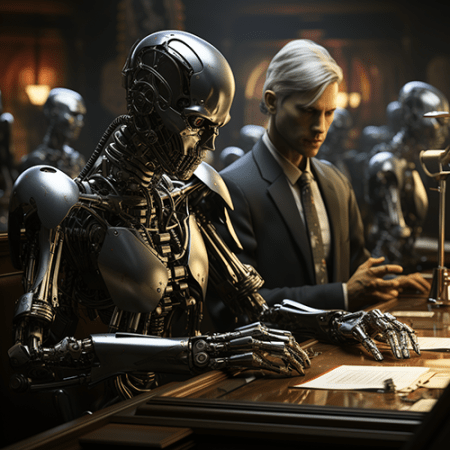From Boris to Bots: Our First Dive into the DefCon Universe. This begins a series of blogs chronicling the infamous DefCon event in Las Vegas. The next installment will cover President Biden’s unprecedented request for hackers to attend DefCon to hack AI, and the hackers enthusiastic response, including reporter-AI-hacker Ralph Losey, to break existing AI software in an open contest. In addition, nearly all of the top cybersecurity leadership of the White House and Department of Homeland Security personally attended DefCon, including the Homeland Security Department Secretary himself, Alejandro Mayorkas. They came to help officially open the conference and stayed to give multiple policy statements and answer all hacker questions. It was a true breakthrough moment in cyber history.

I attended DefCon 31, on August 10-15, 2023, as independent Press, accompanied by my co-reporter daughter, a former lobbyist with an English Lit background, and her dog, Boris. Our press status with special green badge had a high price tag, but it gave us priority access to everything. It also facilitated our interaction with notable figures, from the White House Science Advisor, Arati Prabhakar, to DefCon’s enigmatic founder, Dark Tangent.
DefCon is the world’s largest tech hacker “conference” – more like a inter-dimensional portal at the Caesars Forum. When we first checked in, we happened to meet the leader of DefCon Press and P.R. She fell for little Boris in a handbag, and declared him the official DefCon 31 dog! What an honor. Way to go Boris, who everyone thinks is a Chihuahua, but is really a Russian Terrier. Nothing is as it seems at DefCon. The guy you see walking around in shorts, who looks like a bearded punk rocker, may actually be a senior NSA fed. We will tell you why the NSA was there later in this series.
At DefCon, we immersed ourselves in a diverse crowd of over 24,000 elite tech experts from across the globe. This included renowned names in Cybersecurity, notably the formidable red team professionals. Most of these hackers are law-abiding entrepreneurs, as well as members of top corporate and federal red and blue teams. Several thousand were there just to answer President Biden’s call for hackers everywhere to come to DefCon to compete to break AI. Such a request had never been made before. Much more on this later, including my joining in the AI competition.
The tech experts, hackers all, came together for the thirty-first year of DefCon. We were drawn to participate, and in our case, also report on, the hundreds of large and small lectures and other educational events, demonstrations and vendor exhibitions. In addition, the really big draw was, as usual, the dazzling array of hacker challenges and competitions. Some of these are quiet serious with major prizes and rep at stake, and required pre-qualifications and success in entry rounds. But most were open to all who showed up.
Picture walking into a football stadium, but in place of athletes, you’re surrounded by the world’s tech elite, each donning distinctive hacker attire. As we flooded in by the thousands, it was a blend of seasoned pros and enthusiastic fans. I counted myself among the fans, yet I eagerly took on several challenges, such as the AI red team event. The sheer diversity and expertise of all participants was impressive.
The entrance boasted a towering, thirty-foot neon sparkling mural that caught my eye immediately. I’ve refined the photo to focus on the mural, removing the surrounding crowds. And, just for fun, there’s an alien addition.

The open competitions came in all shapes and sizes: hacker vs. computers and machines of all types, including voting machines, satellites and cars; hacker vs. hacker contests; and hacker teams against hacker teams in capture the flag type contests. An article will be devoted to these many competitions, not just the hacker vs. AI contest that I entered.
There was even a writing contest before the event to compete for the best hacker-themed short story, with the winner announced at DefCon. I did not win, but had fun trying. My story followed the designated theme, was set in part in Defcon, and was a kind of sci-fi, cyber dystopia involving mass shootings with AI and gun control to the rescue. The DefCon rules did not allow illustrations, just text, but, of course, I later had to add pictures, one of which is shown below. I’ll write another article on that fiction writing contest too. There were many submissions, most were farther-out and better than my humble effort. After submission, I was told that most seemed to involve Ai in some manner. It’s in the air.

So many ideas and writing projects are now in our head from these four days in Vegas. One of my favorite lectures, which I will certainly write about, was by a French hacker, who shared that he is in charge of cybersecurity for a nuclear power plant. He presented in a heavy French accent to a large crowd on a study he led on Science Fiction. It included statistical analysis of genres, and how often sci-fi predictions come true. All of DefCon seemed like a living sci-fi novel to us, and I am pretty sure there were multiple aliens safely mingling with the crowd.
We provide this first Defcon 31 chronicle as an appetizer for many more blogs to come. This opening provides just a glimpse of the total mind-blowing experience. The official DefCon 31 welcome trailer does a good job of setting the tone for the event. Enlarge to full screen and turn up the volume for best affects!
Next, is a brief teaser description and image of our encounter with the White House Science Advisor, Dr. Arati Prabhakar. She and her government cyber and AI experts convinced President Biden to issue a call for hackers to come to Defcon, to try to break (hack) the new AI products. This kind of red team effort is needed to help keep us all safe. The response from tech experts worldwide was incredible, over a thousand hackers waited in a long line every day for a chance to hack the AI, myself included.
We signed a release form and were then led to one of fifty or more restricted computers. There we read the secret contest instructions, started the timer, and tried to jail break the AI in multiple scenarios. In quiet solo efforts, with no outside tools allowed and constant monitoring to prevent cheating, we tried to prompt ChatGPT4 and other software to say or do something wrong, to make errors and hallucinate. I had one success. The testing of AI vulnerabilities is very helpful to AI companies, including OpenAI. I will write about this is in much greater detail in a later article, as AI and Policy were my favorite of the dozens of tracks at DefCon.
A lot of walking was required to attend the event and a large chill-out room provided a welcome reprieve. They played music there with DJs, usually as a quiet background. There were a hundred decorated tables to sit down, relax, and if you felt like it, chat, eat and drink. The company was good, everyone was courteous to me, even though I was press. The food was pretty good too. I also had the joy of someone “paying it forward” in the food line, which was a first for me. Here is a glimpse of the chill out scene from the official video by Defcon Arts and Entertainment. Feel it. As the song says, “no one wants laws on their body.” Again, go full screen with volume up for this great production,
As a final teaser for our DefCon chronicles, check out my Ai enhanced photo of Arati Prabhakar, whose official title is Director of the Office of Science and Technology. She is a close advisor of the President and member of the Cabinet. Yes, that means she has seen all of the still top secret UFO files. In her position, and with her long DOD history, she knows as much as anyone in the world about the very real dangers posed by ongoing cyber-attacks and the seemingly MAD race to weaponize AI. Yet, somehow, she keeps smiling and portrays an aura of restrained confidence, albeit she did seem somewhat skeptical at times of her bizarre surroundings at DefCon, and who knows what other sights she has been privy too. Some of the questions she was asked about AI did seem strange and alien to me.

Stay tuned for more chronicles. Our heads are exploding with new visuals, feelings, intuitions and ideas. They are starting to come together as new connections are made in our brains’ neural networks. Even a GPT-5 could not predict exactly what we will write and illustrate next. All we know for certain is that these ongoing chronicles will include video tapes of our interviews, presentations attended, including two mock trials of hackers, as well as our transcripts, notes, impressions and many more AI enhanced photos. All videos and photos will, of course, have full privacy protection of other participants who do not consent, which the strict rules of Def Con require. If you are a human, Ai or alien, and feel that your privacy rights have been violated by any of this content, please let us know and we will fuzz you out fast.

Ralph Losey Copyright 2023 (excluding the two videos, photo and mural art, which are Def Con productions).



 Posted by Ralph Losey
Posted by Ralph Losey 





















